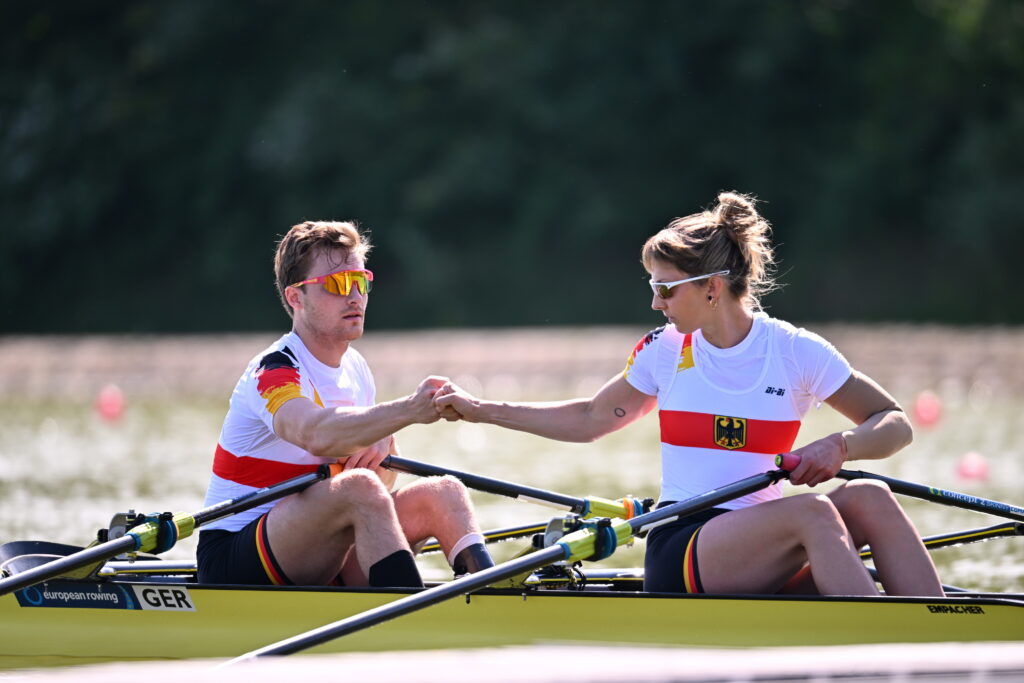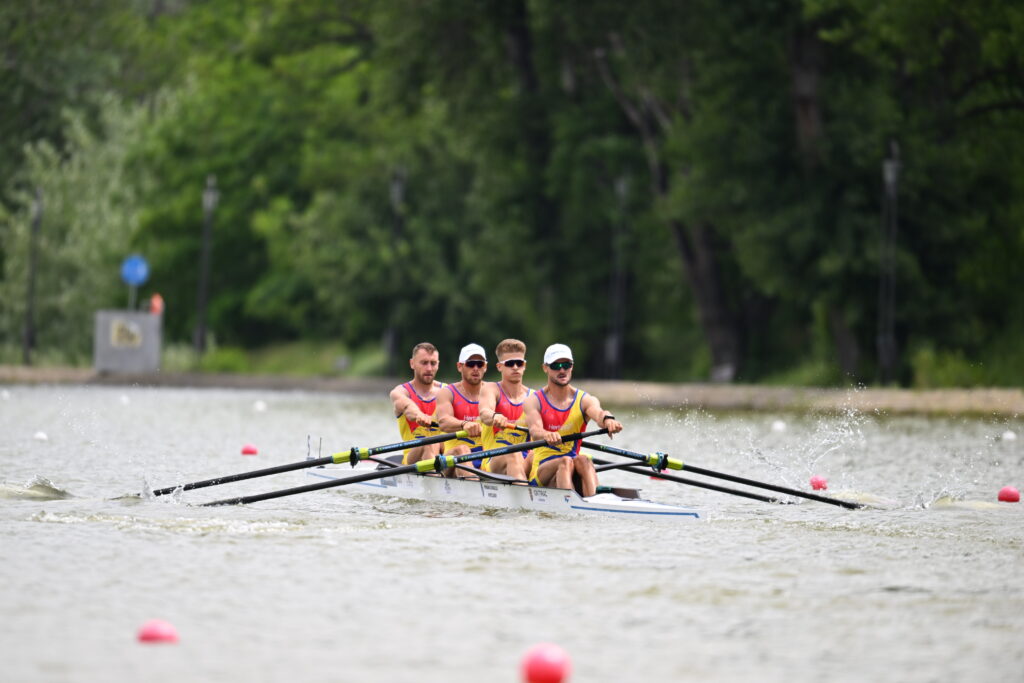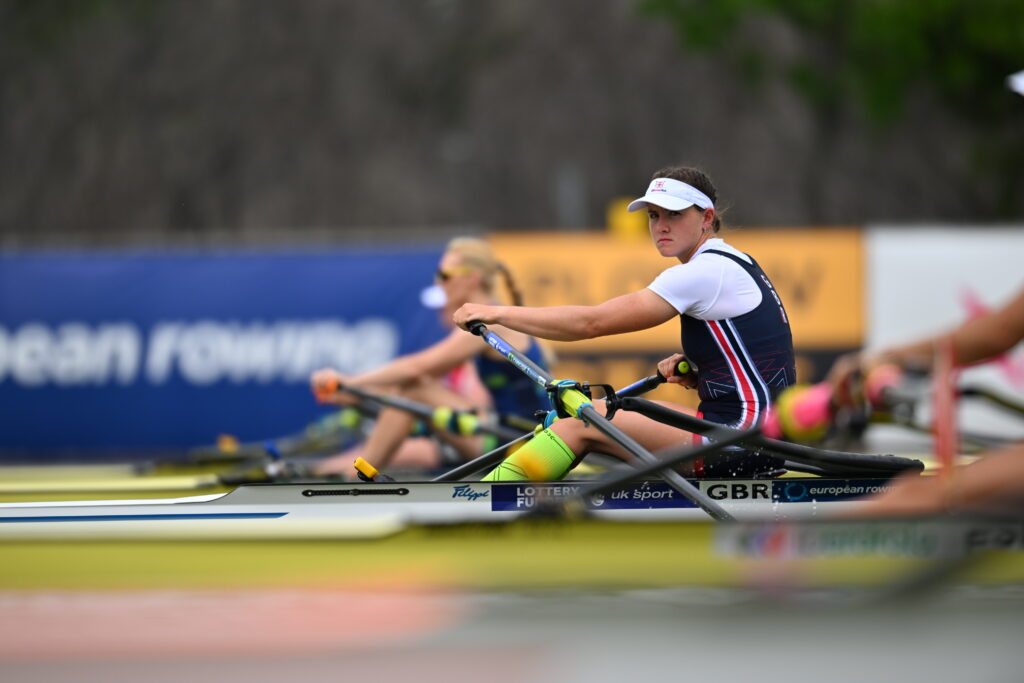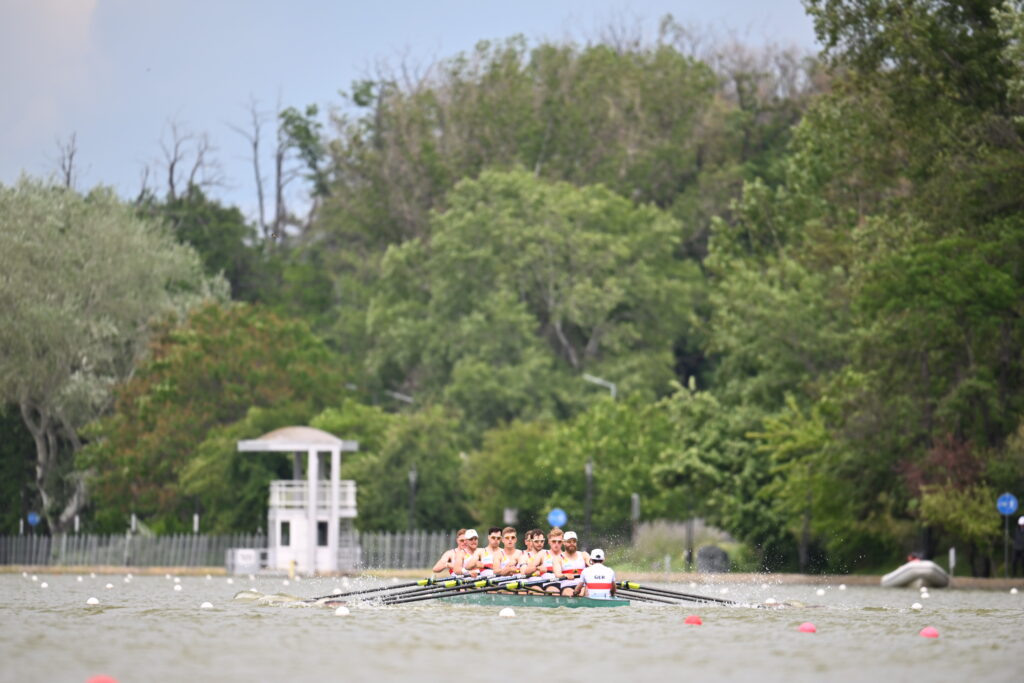
29 May 2025
European Championship best times plummet in Plovdiv tailwind
The 2025 international rowing season is officially underway with the heats of the 2025 European Rowing Championships in Plovdiv, Bulgaria on Thursday.
The warm, shallow waters of the Plovdiv regatta course, coupled with a brisk tailwind, meant that from the very first race European Championship best times (EChBTs) were falling. The fast times were driven also by the new progression system, which means that crews missing out on direct qualification by finishing first or second in their heats go through based on time. As a result some boats that were third or fourth in their heats will race the semifinals or A-finals, while others were relegated to minor finals.
Best times fall in para events
The regatta started with a dominant showing by PR1 men’s single sculls Paralympic champion Benjamin Pritchard of Great Britain, who set a European best time of 8:47.88 in heat 1 of the event. It was the first time Pritchard has broken the nine-minute mark at an international competition. He admitted afterwards he has found the winter tough, juggling family and work commitments with his rowing training, but he said: “To come out here and put that performance down shows that it’s worth it. I love what I do, I love being on the water and I love rowing, so to see that that’s still going well hopefully onwards and upwards.”
 Another European best time fell in the PR3 mixed double sculls, as Germany’s new combination of Kathrin Marchand and Valentin Luz impressed in the preliminary race. They won in 7:01.35, nearly six seconds faster than the previous marker, and beat Paralympic silver medallists Great Britain in the process.
Another European best time fell in the PR3 mixed double sculls, as Germany’s new combination of Kathrin Marchand and Valentin Luz impressed in the preliminary race. They won in 7:01.35, nearly six seconds faster than the previous marker, and beat Paralympic silver medallists Great Britain in the process.
European bests in both pairs events
The men’s pairs heats were incredibly close, with the previous EChBT broken three times – first by Florin Arteni and Florin Lehaci of Romania in heat 2 (6:17.90), then by both Spain’s Jaime Canalejo and Javier Garcia, in 6:16.21, with Switzerland second in 6:17.02 in heat 3. The semifinals will be spicy. On the women’s side, Romania’s Simona Radis and Maria Magdelena Rusu were by far the fastest crew in 6:51.79, taking top spot into the final.
Former lightweights shine in doubles
With the lightweight men’s and women’s double sculls now eliminated from the Olympic programme, many former lightweights are looking towards Los Angeles 2028 in openweight events. In the women’s double sculls, Greece’s Olympic lightweight bronze medallists Zoi Fitsiou and Dimitra Kontou won their heat narrowly ahead of Ireland, featuring former lightweight Margaret Cremen. The Netherlands and Romania were the direct qualifiers from heat 1, with Spain and Great Britain the two boats completing the final lineup.
In the men’s event, Italy’s Gabriel Soares, lightweight silver medallist at the Paris 2024 Olympic Games, and fellow former lightweight Niels Torre won their heat too. The Greek men – like their female counterparts, Olympic lightweight bronze medallists – also progressed to the semifinals, as did Ireland, featuring Olympic champion Fintan McCarthy, and Switzerland, with reigning lightweight men’s double sculls European champion Raphael Ahumada on board. But it was Romania’s men’s double sculls Olympic champions Andrei Cornea and Marian Enache who set the standard, with an EChBT of 6:05.73.
European bests for Dutch and Romanian fours
 Romania set an EChBT in the men’s four, of 5:44.06, after coming out on top of a close race against Croatia in heat 2. But Croatia’s boat of brothers – three-time Olympic champions Martin and Valent Sinkovic, and the younger Loncaric twins, Patrik and Anton – were second fastest overall and have started their new project well. The Netherlands edged out France to win heat 1. Great Britain’s new crew will not have the chance to defend their nation’s European title after finishing off the pace.
Romania set an EChBT in the men’s four, of 5:44.06, after coming out on top of a close race against Croatia in heat 2. But Croatia’s boat of brothers – three-time Olympic champions Martin and Valent Sinkovic, and the younger Loncaric twins, Patrik and Anton – were second fastest overall and have started their new project well. The Netherlands edged out France to win heat 1. Great Britain’s new crew will not have the chance to defend their nation’s European title after finishing off the pace.
The Netherlands impressed in the women’s four preliminary race, setting a European best time of 6:21.94. Romania and Great Britain were second and third.
Close racing in the quads
France have never won a European championship medal in the women’s quadruple sculls, but by beating defending champions Great Britain in the heat in an EChBT of 6:11.44, they have established themselves as the favourites for the final. The Netherlands won heat 2 by about 1.5 seconds ahead of Ukraine, but in a marginally slower time than the British.
In the men’s heats, defending champions Italy produced a storming finish to overhaul Poland in heat 3, while Spain outsprinted Germany for second place behind Great Britain in heat 1 to progress to the semifinals. Bulgaria were the unlucky 13th-placed crew who were eliminated from competition.
Britain’s Henry obliterates European best
 The world best time of 7:07.71 in the women’s single sculls is one of the longest-standing records in rowing, set in 2002 by Bulgarian legend Rumanya Neykova. In Plovdiv, Great Britain’s Lauren Henry came very close to beating that time, winning her heat in 7:09.76 – one of the fastest times in history and an EchBT by a big margin. Henry is one of several women’s single scullers to impress having switched to the boat class for this season, with Fiona Murtagh of Ireland also winning her heat having raced sweep for her whole senior career.
The world best time of 7:07.71 in the women’s single sculls is one of the longest-standing records in rowing, set in 2002 by Bulgarian legend Rumanya Neykova. In Plovdiv, Great Britain’s Lauren Henry came very close to beating that time, winning her heat in 7:09.76 – one of the fastest times in history and an EchBT by a big margin. Henry is one of several women’s single scullers to impress having switched to the boat class for this season, with Fiona Murtagh of Ireland also winning her heat having raced sweep for her whole senior career.
Zalaty quickest; Weber takes on Zeidler’s mantle
Olympic men’s single sculls silver medallist Yauheni Zalaty (AIN) was the fastest of the scullers progressing to the semifinals in Plovdiv, in an EChBT of 6:38.51. He is joined by the likes of fellow Paris 2024 finalists Stefanos Ntouskos (GRE) and Tim Brys (BEL) – as well as Germany’s Marc Weber, who stepped into the single in the absence of reigning European, world and Olympic champion Oliver Zeidler and won his heat ahead of Brys.
Is the Deutschlandachter back?
 The German men’s eight has been their flagship boat for some time, but have had a tricky few years, missing out on a medal in Paris. They were silver medallists at the European Rowing Championships last year, behind Great Britain, but in Thursday’s heats the tables were turned and on five-seat Olaf Roggensack’s 28th birthday they set an EChBT of 5:18.79, just 0.11 seconds shy of the world best time. Meanwhile the Dutch women have also sent an eight to the European Rowing Championships for the first time in a couple of years, and they set an EChBT of 5:58.13. With Romania and Great Britain not far behind in time, the women’s eight final looks set to be a cracker.
The German men’s eight has been their flagship boat for some time, but have had a tricky few years, missing out on a medal in Paris. They were silver medallists at the European Rowing Championships last year, behind Great Britain, but in Thursday’s heats the tables were turned and on five-seat Olaf Roggensack’s 28th birthday they set an EChBT of 5:18.79, just 0.11 seconds shy of the world best time. Meanwhile the Dutch women have also sent an eight to the European Rowing Championships for the first time in a couple of years, and they set an EChBT of 5:58.13. With Romania and Great Britain not far behind in time, the women’s eight final looks set to be a cracker.
Young lightweight scullers on top
Germany’s Fabio Kress was the fastest of the entrants in the lightweight men’s single sculls, winning his heat to claim top spot in the final. 19-year-old Turkish sculler Halil Kaan Koroglu won heat 2 and the final looks like it will be tight. Lara Tiefenthaler of Austria took first place in a well-contested lightweight women’s single sculls preliminary race, ahead of Isobel Clements of Ireland.

